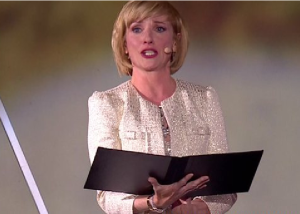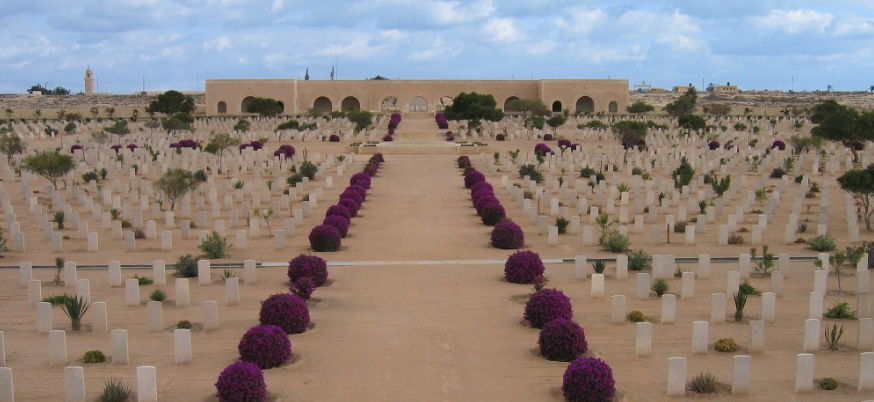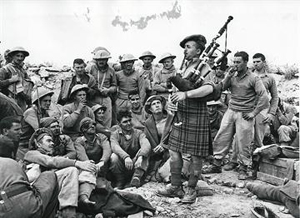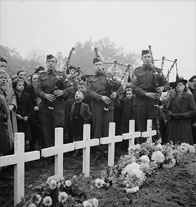One of the most touching moments in the VE Day commemoration concert at the weekend came when actress Jane Horrocks wept whilst reading the last letter home of Lieutenant George F Morrison of the 7th Battalion of the Black Watch.
Lt. Morrison was a piper and talks of going into battle ‘happy as a cricket’ with his ‘chanter in his knapsack’. He was from Crieff in Perthshire the son of Andrew and Norah Morrison. He was killed in action in October 1942. He was 21. He is buried in the El Alamein War Cemetery.
Readers in the UK will be able to access the clip here. The actress read: ‘This is a queer letter to write because I’ll be dead then and if you get it I’ll feel excessively cheery…this death business doesn’t worry me in the least…so if I do get one don’t be too sad. It’s too late to be sad and I wouldn’t like it.
‘If you would just get the organist to play Handel’s ‘largo’ in my memory in the kirk one Sunday morning then that’s as far as you should grieve for me. So don’t be sad please; remember this war is being fought to protect folk like you from horrible things and it is only right that some should have the privilege, yes, the privilege, to give themselves for the cause of good and the right.

‘I’m still firmly convinced that it won’t be me, but just in case it is then you can have this letter to tell you that I went out to die as cheery as a cricket with a song in my mouth and my chanter in my small pack and a couple of grenades in my pockets. As to all my stuff here, it will probably be sold and the proceeds sent you. My stuff at home give to anyone who needs it….For my family I leave you my blessing and may God protect and help you through the hard times and give you strength as He does for me now as I write this.
‘And so nonny, for the last time goodbye and keep that old chin up just as well as ever. God bless you always my dearest mother, your loving son George.’

If anyone has any information on Lt Morrison, and in particular his piping career, we would be grateful if you could pass it on to pipingpress@gmail.com. The picture at the top of the article shows the combined Pipes and Drums of the Royal Regiment of Scotland playing during the parade at the end of the VE Day Commemoration Service in London.

The regimental history of the Black Watch records the following about El Alamein: ‘The Highland Division advanced along a line a mile and a half wide, the men spaced five metres apart to make it more difficult for the enemy machine gunners to locate them, a separation that could make a man feel all alone in the smoke, dust and cacophony of the battlefield. To stiffen their resolve, Wimberly sent them off with the exhortation, ‘Scotland for ever and second to none’, and to each company, he attached a kilted piper, the skirl of the bagpipes piercing the noise of the bombardment and providing an emotional tie between the men and their homeland.
‘Amongst the regiments of the Highland Division was a battalion of the Black Watch……As one of their companies approached a machine gun post, the merciless fire hit their piper, Duncan MacIntyre, but he carried on playing and broke into the regimental march, ‘Highland Laddie’. As the assault continued, Duncan was hit again, this time fatally, but he carried on playing until his breath gave out. The following morning he was found with his pipes still under his arm, his fingers on the chanter. He was 28 years old.
 ‘Duncan had been born on the island of Islay in the Hebrides to a family of pipers. His family, later, uprooted and moved to Glasgow where his father and cousin found work playing in the Glasgow police band and Duncan in the city transport band. In June 1942, Duncan embarked from Clydeside with his regiment to sail round the Cape of Good Hope and up the East Coast of Africa to Suez, avoiding the Mediterranean which was deemed too dangerous. He disembarked in August, 1942, and was killed two months later. He is buried in the El Alamein Commonwealth Cemetery along with two other pipers from the 51st Division.’
‘Duncan had been born on the island of Islay in the Hebrides to a family of pipers. His family, later, uprooted and moved to Glasgow where his father and cousin found work playing in the Glasgow police band and Duncan in the city transport band. In June 1942, Duncan embarked from Clydeside with his regiment to sail round the Cape of Good Hope and up the East Coast of Africa to Suez, avoiding the Mediterranean which was deemed too dangerous. He disembarked in August, 1942, and was killed two months later. He is buried in the El Alamein Commonwealth Cemetery along with two other pipers from the 51st Division.’
A memorial trophy in Duncan MacIntyre’s name is competed for each year at the Scottish Pipers’ Association annual professional competition.
[wds id=”10″]




















Recent Comments